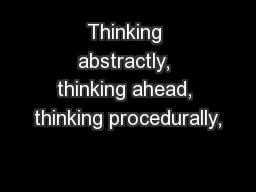PPT-Forward Thinking – Thinking Differently About Specific Learning Differences
Author : min-jolicoeur | Published Date : 2018-11-10
University of Derby Post92 university Second most diverse university in the UK HEPI 2018 16300 students on campus 13375 UG 12 disabled students 6 Specific Learning
Presentation Embed Code
Download Presentation
Download Presentation The PPT/PDF document "Forward Thinking – Thinking Differentl..." is the property of its rightful owner. Permission is granted to download and print the materials on this website for personal, non-commercial use only, and to display it on your personal computer provided you do not modify the materials and that you retain all copyright notices contained in the materials. By downloading content from our website, you accept the terms of this agreement.
Forward Thinking – Thinking Differently About Specific Learning Differences: Transcript
Download Rules Of Document
"Forward Thinking – Thinking Differently About Specific Learning Differences"The content belongs to its owner. You may download and print it for personal use, without modification, and keep all copyright notices. By downloading, you agree to these terms.
Related Documents














